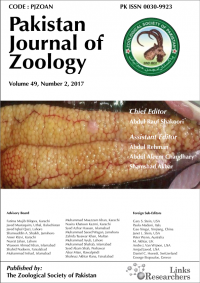ABSTRACT
The present study was conducted to investigate the possible protective effect of ginger on patulin (PAT)-induced hepato-renal toxicity in male rats. Rats were intraperitoneally (i.p) injected with PAT in a single dose (3.75mg/kg body weight). Rats were treated with ginger in a dose (100 mg/kg-1 body weight) for 4 weeks and 8 weeks. Blood samples for biochemical analysis and liver tissues were collected and fixed in 10% formalin for histopathological studies. The present study showed that, PAT causes elevated alanine aminotransferase (ALT) and aspartate aminotransferase (AST) activities and significantly increases serum level of malondialdehyde (MDA) but decrease the activity of superoxide dismutase (SOD) enzyme. On the other hand, in patuilin injected rats and treated with ginger, the activity of ALT, AST and SOD were improved and level of MDA was decreased significantly. The liver and kidney tissues showed markers of improvement after treatment the patulin rats with ginger. In conclusion, treatment with ginger can protect liver and kidney form the toxicity induced by patuilin.
To share on other social networks, click on any
share button. What are these?









